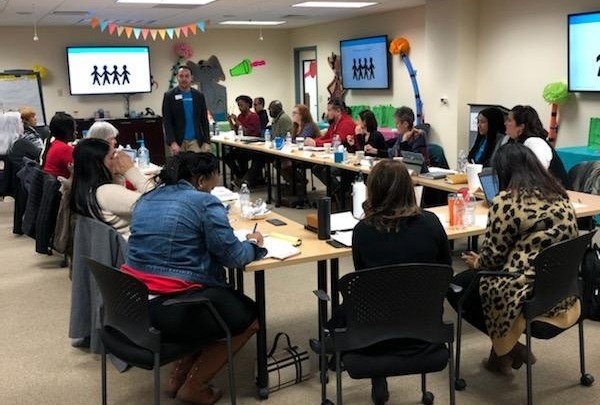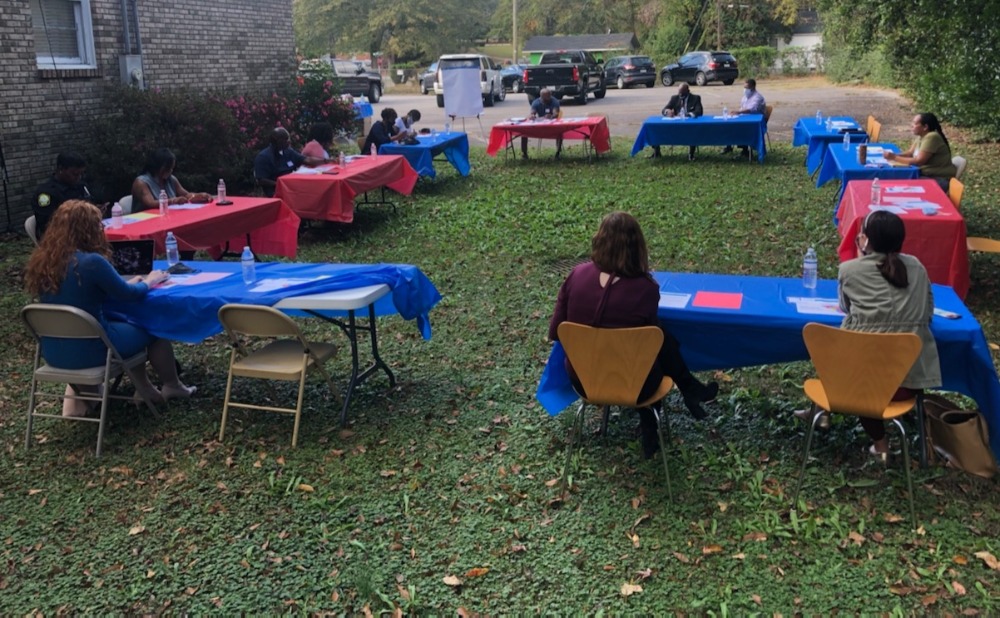The Empower Action Model, developed by Children’s Trust as a framework for preventing child maltreatment and promoting well-being for all individuals through the intentional building of protective factors, is being put into practice through pilot partnerships with coalitions in Oconee, Marlboro and Richland counties.

Mike Shirley, Children’s Trust community education manager, addresses a 2019 meeting of the core teams from the three Empower Action coalitions in South Carolina.
Amaris Gibson offers one word when discussing the impact of a new countywide plan being developed by Empower Oconee to prevent childhood adversity and build well-being and resilience for children and families.
Huge.

Amaris Gibson
As the administrative coordinator for Empower Oconee, Gibson believes the coalition has put groundwork into place that can provide enhanced, coordinated support and resources for families.
“Our community is comprised of change agents, innovative businesses and passionate individuals who, when given the opportunity to implement the Empower Oconee action plan, will momentously rise to the occasion,” Gibson said. “We believe implementation of our plan will create community cohesiveness and lasting change within the lives of children and families. Through the programs and activities birthed from the action plan, we believe we will see a more resilient, more empowered, more community-minded Oconee.”
Children’s Trust is partnering with three coalitions in Oconee, Marlboro and Richland counties to pilot its Empower Action Model and build actionable plans for growing resilience and preventing child maltreatment. Children’s Trust wants to eventually expand this implementation of the Empower Action Model across the state. The process is part of a commitment to building health, well-being and resilience for children and families in a way that is racially equitable, sustainable and meaningful.
Dana Powell, the parent and community engagement coordinator for Children’s Trust, said the goal of the model is to provide structure for building family well-being across entire communities. Empower Oconee, Empower Marlboro County and Resilient Richland have spent more than a year examining local data, learning about adverse childhood experiences and protective factors, and assessing community needs to develop a long-term, sustainable prevention plan by using this model.

Dana Powell
“With a broad and diverse community voice, the coalitions have developed their plans – each focused on three priority areas they identified,” Powell said. “Now the work begins. As these coalitions shift from planning the work to working their plans, counties will see greater support for parents of young children, more peer and mentoring programs for both adults and young people, development of strong, safe neighborhoods, and more services available for families to strengthen protective factors that will not only prevent abuse and neglect but allow children and families to thrive.”
Andre Goodman, youth program manager of United Way of the Midlands, stated Resilient Richland has identified strategic interventions that will help build concrete supports for families to overcome economic inequities, increase social support networks to assist with stress management, allow striving youth to expand boundaries to reduce inequitable outcomes, and give community members a strong, equal voice to the planning and decision-making process in the work to improve their community.

Andre Goodman
He hopes to see the greater community get engaged in the process as one of the next steps.
“Interested community members and organizations can volunteer their time to mentor our youth in need of positive connections with adults who listen to them and support their development by participating in learning sessions that aim to create a culturally diverse experience,” Goodman said.
Joe Bittle, chief of community health for CareSouth Carolina, noted that Empower Marlboro County (EMC) had additional challenges developing strategies during the planning process due to the COVID-19 pandemic.
He is hopeful that community members will be ready to volunteer in the different projects being developed by coalition in order to build greater access to community resources and support systems as well as alleviate some of the stressors in the lives of families.

Joe Bittle
“EMC has already worked on the resiliency kits, which have been distributed prior to Halloween for the community in Marlboro County,” Bittle said. “Our hope is that EMC will begin to implement the rest of the programs in the next three to six months.”
Each of the coalitions are working on timetables to put their plans into action. For instance, Gibson notes that Empower Oconee has work groups for three focus areas that will begin meeting in January 2021 with the idea of extensively planning program implementations and events that will target their population. The last nine months of the year will be spent maintaining those programs and building their capacity.
Children’s Trust is facilitating each of these efforts. Powell works with the Oconee County coalition; Michael Shirley, Children’s Trust community education manager, works with Resilient Richland; and Lauren Szymonik, who guides strengthening families and empower action efforts for Children’s Trust in the Pee Dee, works with Marlboro County’s coalition.
Gibson’s group in Oconee is spreading the word of this initiative through monthly newsletters, social media outlets, personal meetings with business owners, and visibility at multiple community events. A recent story in the Seneca Journal explained the coalition’s vision for the community.
“It is our hope that the work we implement will create transgenerational wholeness,” she said.

Resilient Richland recently held a socially-distanced meeting to discuss the progress being made building community resilience.






